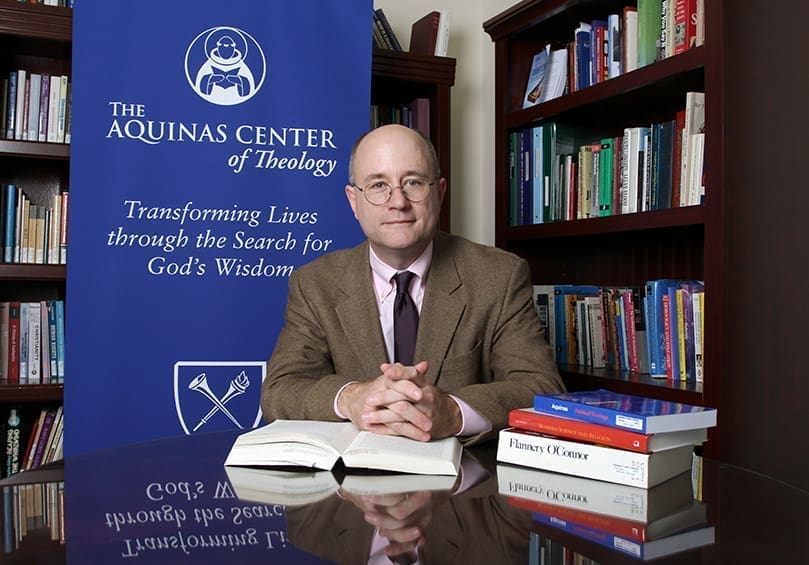 Photo By Michael Alexander
Photo By Michael AlexanderAtlanta
Aquinas Center Vision Recharging In 25th Year
By ANDREW NELSON, Staff Writer | Published April 12, 2012
The Aquinas Center of Theology at Emory University is marking its 25th anniversary with a renewed vision.
“Transforming lives through the search for God’s wisdom” is its new logo as it looks to its future.
Executive Director Phillip Thompson said the center’s goal is to “represent the breadth and depth of the Catholic intellectual and spiritual tradition” on campus and to the wider Atlanta community.
“I think its key parts are ‘transforming’ and ‘search.’ We don’t want to just be mildly edifying but to transform people’s faith by deepening their understandings. We want them to think, to question, to wonder, to reflect and to act on the basis of a deeper understanding,” said Thompson in an email.
One of four Catholic academic centers at non-Catholic universities and colleges, the center grew out of a house of studies established by the Dominicans of the Southern Province. In 1987, it became a nonprofit and an affiliate of the university.
The center has enriched Emory enormously, said Jan Love, the dean of the Candler School of Theology, in a statement.
“The Aquinas Center makes a powerful contribution to the life of Emory University through the active presence of the Catholic intellectual tradition on campus,” she said.
The center partnered with other Emory departments to bring religious leaders of influence to campus, including former Vatican official Cardinal Walter Kasper and Father John Jenkins, the president of Notre Dame University, and Mary Ann Glendon, a former U.S. ambassador to the Vatican.
There are many Catholic resources on campus, including collections at the Pitts Theology Library from correspondence and sermons of Blessed John Henry Newman, noted 19th-century English Catholic convert, to notebooks from Thomas Merton and letters from author Flannery O’Connor. Students can pursue a Catholic studies minor at Emory, one of the few non-Catholic universities that award such a degree. Catholicism is the second largest religious affiliation on campus, with an estimated 14 percent of students identifying as Catholics, based on a 2010 campus survey, said Thompson.
The Aquinas Center is continuing its mission to open its resources to the community. It hosts an Atlanta Area Business Conference, a one-day event for business leaders to listen to a Catholic perspective on business issues; the Major Catholic Speakers Series, which brings a leading Catholic voice on contemporary issues to campus for a free lecture; and the archdiocesan lecture program, where faculty members of Emory University talk at local parishes. It also endows an Aquinas Professor of Historical Theology in the Candler School of Theology.
And its outreach is taking off. Videos on its website have grown to some 20,000 views, up from 1,052 in 2009, and there are some two-dozen programs a year, more than double since 2006.
When the center opened, Catholics numbered fewer than 150,000 in the Atlanta Archdiocese. Now, there are close to a million.
And so the center is important on campus since the presence of the Catholic Church is growing in this region, and its impact is very evident in national and international areas, said Love.
“Students, faculty, and staff alike need to understand better the depth and breadth of this venerable tradition now and across history,” she said.
Looking ahead, a forum Thompson would like to host is what’s called a “disputato,” a format rooted in the Dominican tradition. In contrast to a debate, here speakers with different views work to find areas of fundamental agreement.
“We want to do those for the community and we want to do those on hot button issues within the Church; it could be contraception, it could be stem cell research, it could be the death penalty,” said Thompson.
The point is not simply to challenge Church teaching, but to have intelligent, adult discussions on current issues, he said.
“It’s done in an open search for truth, in the spirit of good faith. Your position gets stronger when those tough questions are asked,” Thompson said.
“It’s a fantastic tradition, a Dominican tradition,” he said.